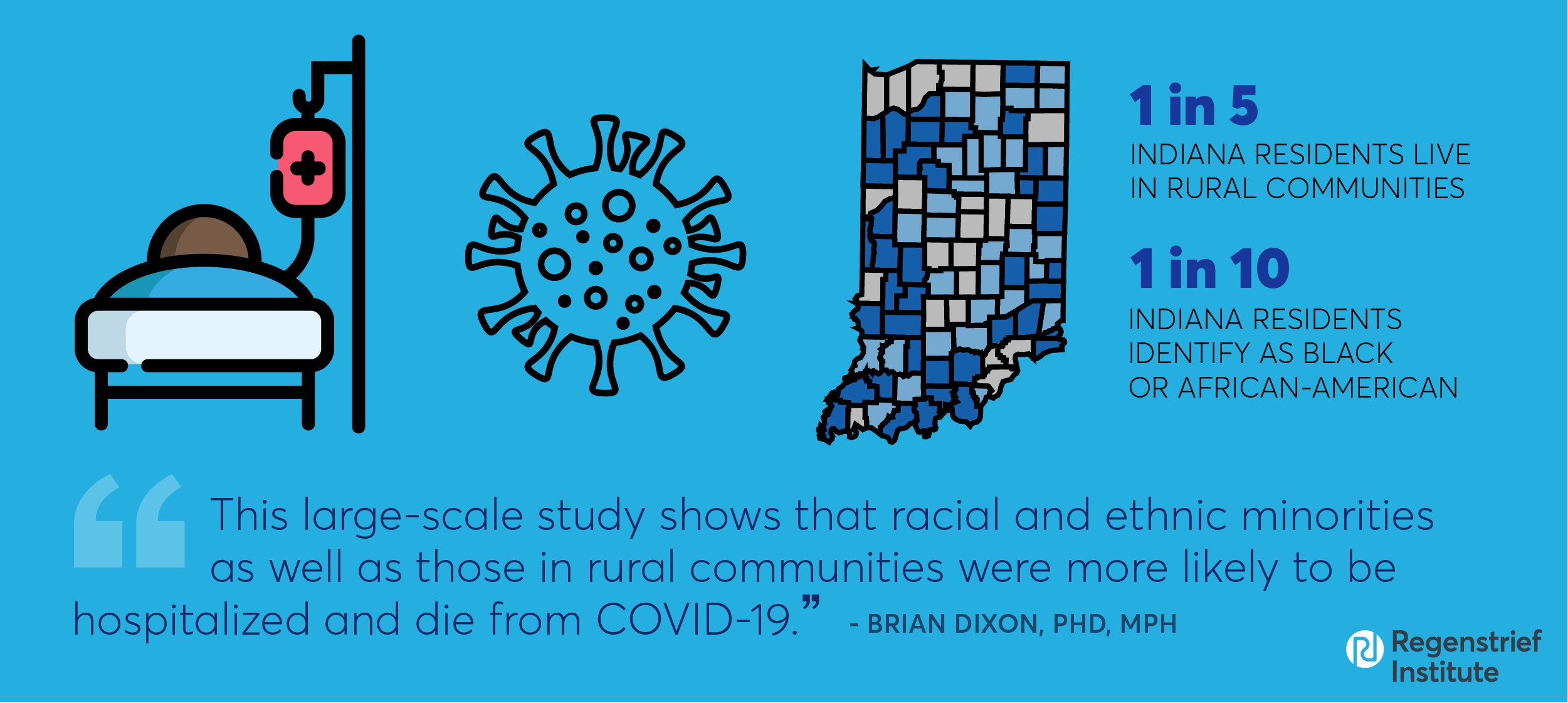Data suggests public health should target specific populations for pandemic interventions
In the largest study of its kind to date, Black communities and rural residents were hit harder than other populations by the COVID-19 pandemic, demonstrated by data from across the state of Indiana. Researchers at Regenstrief Institute and Indiana University say this information highlights important disparities that need to be addressed by public health efforts.
“This large-scale study shows that racial and ethnic minorities as well as those in rural communities were more likely to be hospitalized and die from COVID-19, confirming results of smaller studies and highlighting the disparities we know exist,” said lead author Brian Dixon, PhD, MPA, director of public health informatics at Regenstrief and IU Richard M. Fairbanks School of Public Health. “We hope this information will help to shape both pandemic response and recovery efforts.”
The research team used data from the Indiana Network for Patient Care, managed by Indiana Health Information Exchange (IHIE), which contains patient information from 38 health systems and more than 100 hospitals in Indiana as well as COVID testing results from the Indiana Department of Health. Testing data were linked with hospitalizations and death records. The data used in this study came from 1.8 million Indiana residents who were tested for COVID-19 between March 2020 and the end of December 2020.
The data showed that during the first wave of the virus beginning in March 2020, infections were highest in urban areas, and specifically among Black residents. Starting in the summer, hospitalizations and deaths in rural areas outpaced urban areas. And across the majority of 2020, Black populations and those in rural areas suffered more than white and urban populations.
“This study was conducted before vaccines were widely available, but now that they are, these two populations are some of the most reluctant to receive shots,” said. Dr. Dixon. “COVID-19 has already greatly impacted these groups, so it’s important that public health officials focus their attention on interventions to help these populations. In addition to virus mitigation through vaccination, they may need programs to address social determinants of health and help in recovery from the pandemic.”
Data identifies disparities
This large-scale study was made possible by the data sharing infrastructure that exists in Indiana.
“The ability to link community-based testing with hospital data and death records allows us to measure and monitor these disparities,” said Dr. Dixon. “This helps to demonstrate the power of health information exchanges and the multiple ways they can be leveraged to improve healthcare and public health.”
“The synchronicity of COVID-19 disparities: Statewide epidemiologic trends in SARS-CoV-2 morbidity, hospitalization, and mortality among racial minorities and in rural America” is published online PLOS One.
In addition to Dr. Dixon, authors are Shaun Grannis, M.D., M.S. of Regenstrief and IU School of Medicine; Lauren Lembcke, M.S., Nimish Valvi, MBBS, MPH, and Anna Roberts, M.S., all of Regenstrief; and Peter Embí, M.D., M.S. of Regenstrief and IU School of Medicine.
Dr. Dixon receives funding from the U.S. Agency for Healthcare Research and Quality (R21HS025502) to study health information exchange. Regenstrief and Fairbanks School of Public Health received funds from the State of Indiana and Marion County Public Health Department to support COVID-19 response and mitigation, including disease surveillance and outcomes measurement.
About Brian E. Dixon, PhD, MPA
In addition to his role as Regenstrief Institute and Indiana University Richard M. Fairbanks School of Public Health at IUPUI director of public health informatics, Brian E. Dixon, PhD, MPA, is a research scientist at Regenstrief and an associate professor of epidemiology at the Fairbanks School of Public Health. He is also an affiliate scientist at the U.S. Department of Veterans Affairs Health Services Research and Development Center for Health Information and Communication, Richard L. Roudebush VA Medical Center.
About Regenstrief Institute
Founded in 1969 in Indianapolis, the Regenstrief Institute is a local, national and global leader dedicated to a world where better information empowers people to end disease and realize true health. A key research partner to Indiana University, Regenstrief and its research scientists are responsible for a growing number of major healthcare innovations and studies. Examples range from the development of global health information technology standards that enable the use and interoperability of electronic health records to improving patient-physician communications, to creating models of care that inform practice and improve the lives of patients around the globe.
Sam Regenstrief, a nationally successful entrepreneur from Connersville, Indiana, founded the institute with the goal of making healthcare more efficient and accessible for everyone. His vision continues to guide the institute’s research mission.
About the Richard M. Fairbanks School of Public Health
Located on the IUPUI and Fort Wayne campuses, the Richard M. Fairbanks School of Public Health is committed to advancing the public’s health and well-being through education, innovation and leadership. The Fairbanks School of Public Health is known for its expertise in biostatistics, epidemiology, cancer research, community health, environmental public health, global health, health policy and health services administration.
About IU School of Medicine
IU School of Medicine is the largest medical school in the U.S. and is annually ranked among the top medical schools in the nation by U.S. News & World Report. The school offers high-quality medical education, access to leading medical research and rich campus life in nine Indiana cities, including rural and urban locations consistently recognized for livability.









